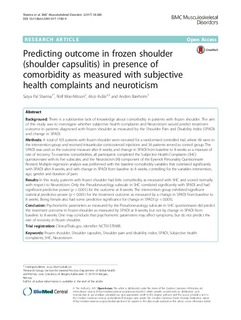| dc.contributor.author | Sharma, Satya P. | |
| dc.contributor.author | Moe-Nilssen, Rolf | |
| dc.contributor.author | Kvåle, Alice | |
| dc.contributor.author | Baerheim, Anders | |
| dc.date.accessioned | 2019-04-03T09:41:56Z | |
| dc.date.available | 2019-04-03T09:41:56Z | |
| dc.date.created | 2017-09-05T14:36:58Z | |
| dc.date.issued | 2017 | |
| dc.identifier.citation | Sharma, S. P., Moe-Nilssen, R., Kvåle, A., & Bærheim, A. (2017). Predicting outcome in frozen shoulder (shoulder capsulitis) in presence of comorbidity as measured with subjective health complaints and neuroticism. BMC Musculoskeletal Disorders, 18(1). | nb_NO |
| dc.identifier.issn | 1471-2474 | |
| dc.identifier.uri | http://hdl.handle.net/11250/2593099 | |
| dc.description.abstract | Background
There is a substantive lack of knowledge about comorbidity in patients with frozen shoulder. The aim of this study was to investigate whether subjective health complaints and Neuroticism would predict treatment outcome in patients diagnosed with frozen shoulder as measured by the Shoulder Pain and Disability Index (SPADI) and change in SPADI.
Methods
A total of 105 patients with frozen shoulder were recruited for a randomised controlled trial, where 69 were in the intervention group and received intraarticular corticosteroid injections and 36 patients served as control group. The SPADI was used as the outcome measure after 8 weeks, and change in SPADI from baseline to 8 weeks as a measure of rate of recovery. To examine comorbidities, all participants completed the Subjective Health Complaints (SHC) questionnaire with its five subscales, and the Neuroticism (N) component of the Eysenck Personality Questionnaire Revised. Multiple regression analysis was performed with the baseline comorbidity variables that correlated significantly with SPADI after 8 weeks, and with change in SPADI from baseline to 8 weeks, controlling for the variables intervention, age, gender and duration of pain.
Results
In this study, patients with frozen shoulder had little comorbidity as measured with SHC and scored normally with respect to Neuroticism. Only the Pseudoneurology subscale in SHC correlated significantly with SPADI and had significant predictive power (p < 0.001) for the outcome at 8 weeks. The intervention group exhibited significant statistical predictive power (p < 0.001) for the treatment outcome as measured by a change in SPADI from baseline to 8 weeks. Being female also had some predictive significance for change in SPADI (p < 0.005).
Conclusion
Psychometric parameters as measured by the Pseudoneurology subscale in SHC questionnaire did predict the treatment outcome in frozen shoulder as measured by SPADI at 8 weeks, but not by change in SPADI from baseline to 8 weeks. One may conclude that psychometric parameters may affect symptoms, but do not predict the rate of recovery in frozen shoulder. | nb_NO |
| dc.language.iso | eng | nb_NO |
| dc.publisher | BioMed Central | nb_NO |
| dc.rights | Navngivelse 4.0 Internasjonal | * |
| dc.rights.uri | http://creativecommons.org/licenses/by/4.0/deed.no | * |
| dc.title | Predicting outcome in frozen shoulder (shoulder capsulitis) in presence of comorbidity as measured with subjective health complaints and neuroticism | nb_NO |
| dc.type | Journal article | nb_NO |
| dc.type | Peer reviewed | nb_NO |
| dc.description.version | publishedVersion | nb_NO |
| dc.rights.holder | © The Author(s) 2017. | nb_NO |
| dc.subject.nsi | VDP::Medisinske Fag: 700::Helsefag: 800::Fysioterapi: 807 | nb_NO |
| dc.source.pagenumber | 7 | nb_NO |
| dc.source.volume | 18 | nb_NO |
| dc.source.journal | BMC Musculoskeletal Disorders | nb_NO |
| dc.identifier.doi | 10.1186/s12891-017-1740-9 | |
| dc.identifier.cristin | 1491147 | |
| cristin.unitcode | 203,3,11,0 | |
| cristin.unitname | Institutt for ergo/fysio/radio - Bergen | |
| cristin.ispublished | true | |
| cristin.fulltext | original | |
| cristin.qualitycode | 1 | |

